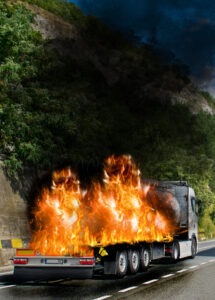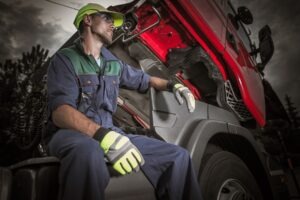

Tanker Truck Accident Attorney, Michael Beckman
Millions of big trucks (15.5 million, to be exact) transport nearly 70 percent of all freight that moves on American roads. These goods moving within the U.S. and between the United States, Canada, and Mexico are worth nearly $1 trillion annually. Read on to learn all about tanker truck accidents from the Fort Myers truck accident lawyers at Viles & Beckman, LLC.
Of that staggering amount, tanker trucks move about 25 percent. As the name implies, tanker trucks are different than other big rigs. They consist of a cylindrical tank pulled behind a cab. They’re often carrying dangerous cargo that has the potential to cause devastating vehicle damage and occupant injuries when a tanker truck collides with other vehicles on the road.
Cargo Carried by Tanker Trucks
Tanker trucks carry a different type of cargo than other trucks on the road. The cargo can be as benign as milk or significantly more dangerous. Tankers transport gases, which are almost always hazardous, and include substances such as nitrogen, hydrogen, propane and other natural gasses. They also carry liquid fuels (like gasoline) as well as toxic chemicals and non-potable water. Agricultural businesses use tankers to move fertilizers, agricultural waste, and grain.


Expect More, Receive More: Legal Support That Feels Like Family
Tanker Truck Regulation
Because of their often dangerous cargo, most states have taken steps to ensure that tanker trucks are monitored and that drivers are properly qualified to haul the tanker’s contents.
Florida law requires that tanker truck drivers pass a written examination as well as skill tests to obtain a commercial driver’s license (a CDL), which is required for all big truck drivers. Tanker truck drivers are also required to prove their skills and competency, take an additional test and then receive authorization from the state to operate these kinds of trucks. After all of that, drivers who want to transport hazardous materials must pass an additional written exam and demonstrate they are proficient in tanker-specific skills. Only after they have been successful in completing all of these tasks do they receive their hazardous materials endorsement, allowing them to drive tankers hauling dangerous cargo.
What Causes Tanker Truck Accidents?
Tanker truck accidents can be caused by a multitude of factors such as load size, vehicle conditions, and driver error.
Load Size and Improper Loading
Because their cargo is fully contained within the tanker, there is little chance that the contents of the tanker will end up causing hazardous road conditions without the truck being involved in an accident, unlike other trucks that may carry heavy, oddly shaped objects like cars, lumber, and heavy construction materials that can slip off a trailer and into the roadway.
There are, however, other specific dangers associated with the size of the loads tanker trucks carry. When they transport liquids, proper load size is especially important. When hauling liquids, filling tankers to less than three fourths of their capacity can cause the liquids to “slosh” around when drivers stop or make turns. This can make the truck harder to control. Drivers must ensure that they are aware of their load size and adjust their driving habits accordingly.
Driver Error
While tanker truck drivers are susceptible to the same kinds of driver-caused error as any other driver, the dangerous nature of their cargo makes it especially important that they are fully focused on the road at all times. Some common forms of driver error include:
- Driving while intoxicated with drugs or alcohol can have devastating consequences. Intoxication leads to slower reaction times, an inability to perceive dangerous road conditions, and poor judgment.
- Driving while drowsy has similar effects to intoxication. Divers may lose focus on the road and may also experience slower reaction times. A fatigued driver is a dangerous driver. The federal government has established guidelines for how long commercial truckers can drive on the road and how long they should rest between trips, but the trucking industry is heavily deadline-driven and companies often put pressure on drivers to continue after they should stop. In addition, drivers are usually paid per mile driven and a driver’s personal financial needs might lead them to push on when they should stop and rest.
- Driving at excessive speeds is also a dangerous behavior. While unsafe no matter what kind of vehicle a person is driving, this danger is multiplied when a driver is hauling dangerous cargo. Driving the speed limit might even be unsafe for a tanker truck due to the vehicle’s size or cargo. Speeding is certainly a behavior that should be avoided at all costs—regardless of whether or not a driver is behind schedule or impaired in some way.
- Distracted driving presents dangers too. Looking down at a GPS, reading a text, or talking on the phone can cause drivers to not see obstacles in the road or to miss important warning signs about upcoming dangers, sharp curves, or other hazardous road conditions.
Vehicle Conditions
Improper tanker truck maintenance can have serious consequences, including tire blowouts or accidents due to faulty brakes. All trucks must be inspected before setting off on the road. A rushed or incomplete inspection can miss dangers and cause accidents.
Improper tire pressure or too much wear can cause truck tires to blow out. When a tire gives, the tanker truck becomes much harder to control. Blown out tires can also leave debris in the road, which is a hazard for other drivers. Drivers may swerve to avoid running over a blown out tire and either veer into other lanes or too far off onto the shoulder.
Trucks with faulty or worn down brakes are much harder to stop. A driver who is not aware of this issue may not take appropriate precautions to ensure that they have enough time to stop at a red light or avoid rear-ending the car in front of the tanker.
Dangerous Consequences of Tanker Truck Accidents
Getting into a wreck while hauling dangerous cargo can lead to uniquely devastating consequences. Tanker accident effects can be harmful to not just those involved but also those in surrounding areas, sometimes even miles away.
Spills and Chemical Leaks
Nearly any tanker accident can lead to cargo leaks or spills. Depending on the type of cargo and the size of the leak, people living or working in the area may need to evacuate their homes or offices. Of course, if those some distance away are required to evacuate, those in the immediate vicinity must also avoid chemical exposure at the accident scene. This can lead to delays in assessing the damage to vehicles and make it difficult to reach victims to provide medical care.
Victims who are too badly injured to leave the area immediately or who are trapped inside their vehicles may experience chemical burns as those dangerous materials escape the tanker. Serious chemical burns can cause disfigurement, muscle and tissue damage, infection, or even the loss of digits or limbs.
Breathing Toxic Fumes
Some chemicals can cause damage without coming into contact with skin. Breathing certain chemicals is enough to cause both acute and long-lasting health issues. Because some chemicals are odorless, those at the scene may not even realize they are breathing them in. Breathing toxic fumes can cause symptoms including coughing, swelling in the throat and nose, vomiting, and eye irritation or even blindness.
 Explosions and Fires
Explosions and Fires
Explosions can occur if the cargo reacts with heat or elements in the air. Chemicals can leak when the tanker receives a puncture or simply from the accident impact if the chemical is particularly volatile. Explosions and fire significantly increase the risk of serious injury or death for those involved.
Fatalities are more common in accidents during which the cargo explodes or catches fire. Injuries may result in horrific scarring and require ongoing (sometimes lifelong) medical care or painful skin grafts.
What to Do After a Tanker Truck Accident
When a tanker truck accident results in serious injuries, victims can be buried in medical bills that feel overwhelming. Long hospital stays can exhaust medical insurance benefits and leave victims feeling as if they will never get out from under their debt. In fact, medical debt is the leading cause of bankruptcy in the United States.
In addition, victims cannot work, either for a short period of time or the rest of their lives. Even if they can work, they may never return to the work they did before their accident due to physical disabilities or mental health issues.
If you were injured in a tanker truck accident, you might file a personal injury lawsuit against the person who caused it and, in some cases, the company that person worked for. An experienced and competent tanker truck accident attorney can evaluate your case and help you figure out if a lawsuit is appropriate. Some people are leery of filing a lawsuit, but the law allows you to seek compensation for injuries and damages you suffer due to someone else’s fault, and it is often the only way to be able to survive the physical and financial pain you endure in a serious accident.
Under Florida law, you have four years from the date of your accident to file a lawsuit. This may seem like a long time, but in reality, it can slip by if you become consumed with just trying to survive the aftermath of your wreck. Contacting an attorney as soon as you’re able to will allow your case to proceed sooner and potentially allow you to recover damages more quickly. Personal injury suits are complicated. Organizing and preparing for a potential trial is time-consuming and the more time you give your attorney, the better off you’ll be in the long run.
Potential Damage Recovery
Each case is unique and requires its own detailed analysis. The details and type of accident of your specific case will determine the types of damages it makes sense to seek, as discussed below. You may be able to recover some or all of them. Florida law establishes three broad categories of damages: economic, non-economic, and punitive. Below is more info to better understand the types of damages you can recover.
- Economic damages – Think of these damages as things you get a bill for or that are easily calculable, like lost wages. Bills from your transport to the hospital, your hospital stay, cost of surgeries and specialists, therapy (maybe physical, occupational, or speech), follow-up appointments after your release from the hospital, medication regimes, necessary medical devices or equipment, rehabilitation, and lost present and future wages are all economic damages. Future wages are perhaps one of the most difficult types of economic damages to calculate, but with the help of an actuary, it is possible to do so. An actuary will consider your present wages, possibility of advancement, life expectancy, and the time value of money.
- Non-economic damages – Non-economic damages focus on compensating you for the intangible damages you suffered due to your accident. These may include physical pain and suffering, physical impairment, disfigurement, or loss of enjoyment of life. Your spouse may also be able to file a claim seeking compensation for no longer being able to engage in sexual relations, loss of companionship, or other losses they have suffered as a result of your injury.
- Punitive damages – Although rarely awarded in Florida personal injury suits, the facts of your case may make it advantageous to seek punitive damages. These are intended to punish especially egregious behavior and serve to deter others in the community from engaging in the same type of behavior.
An Experienced Tanker Truck Accident Attorney Can Help
These lawsuits are incredibly complicated and take many hours and multiple people to pursue correctly and efficiently. And you can bet the person on the other side of your lawsuit will lawyer up, especially if they are an insurance company or the driver’s employer. These companies have teams of attorneys whose jobs are to fight lawsuits—and you do not want to go it alone.
Hiring your own truck accident lawyer to represent you can level the playing field, and give you the best possible chance that you’ll recover all of the compensation you deserve for what that truck accident put you through.
Fort Myers, FL 33919

 Explosions and Fires
Explosions and Fires




